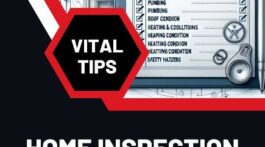Things to Know About Home Inspections
Lost in the home transaction between the buyer and seller is the all-important home inspection. Between qualifying for a loan, negotiating a purchase price, and selling a previous residence, the home inspection might appear at the bottom of the “to-do” list. However, a home inspection can save the potential buyer from making a poor purchasing decision.
Although the buyer usually pays this, it is negotiable between both parties. It is not mandatory, but almost all real estate professionals will suggest it is well worth the expense.
The cost of a home inspection is minor compared to not discovering potentially serious issues.
A home inspection that comes back with several repairs can potentially squash a sale or at least rescind an offer by the buyer. This article will cover what a home inspection entails, what the buyer can expect from the inspection report, what it costs, and under which situations you potentially might decline one.
As a buyer, you want to avoid any home inspection mistakes that could cause issues with your purchase. Confidence in your home inspection decisions is vital to your success.
The Purpose of a Home Inspection
 The entire reason for this process is to decipher the home’s condition. All homes undergo wear and tear over the years. Buyers need to know what they are walking into.
The entire reason for this process is to decipher the home’s condition. All homes undergo wear and tear over the years. Buyers need to know what they are walking into.
Remember that a certified inspector will conduct the inspection. Each state will have its inspector certification process. The individual should be comprehensive. Once the report has been completed, the buyer might be slightly nervous about what he or she reads.
This means that the inspector did their job. In most cases, there won’t be too many surprises. In many real estate contracts, a clause will be contingent upon the completion of the inspection. This is just in case the repairs are so extensive that the buyer needs to walk away. Most buyers and sellers hope there won’t be some kind of inspection deal breaker that causes the transaction to be terminated.
If things don’t go as planned, you’ll need to know what to do when the home inspection goes poorly. Whether you are a buyer or seller, this is a valuable resource loaded with sound tips on dealing with a failed inspection.
Special Case to Avoid
Remember that your knowledgeable real estate agent or anyone in the industry will recommend an inspection. There may be a case where bypassing this part of the home-buying process is warranted.
Suppose a buyer tours the home of their dreams only to find out later that another offer has already been submitted and is under consideration. In this case, the buyer might instruct their agent to relay that they will defer the home inspection. It’s risky, but this will probably motivate the seller to accept the latter’s offer.
Potential Issues That May be Uncovered
The report you receive could be lengthy. All types of issues may reveal themselves. Some of the more significant issues that might be notable could be potential insect infestations.
Drywood termites are a huge problem and scare many buyers away. In certain cities, the only remedy is to “tent” the home. A home that has termites also has potential damage to the wood framing. This could result in a considerable expense.
Other large repair items include water damage. Chimneys and roofs are equally as important (more on that later).
A report will not be limited but should cover the following.
- Mold
- Roof
- Windows
- Plumbing
- Appliances
- Sprinklers
- Fireplace
- Foundation
- Drainage
- Electrical System
After the report is issued, there might be items buyers want to be remedied but shouldn’t expect. These will include items that are superficial and minor.
Here are a few examples:
- Bathroom caulking
- Exterior painting
- Loose doorknobs
What to Expect to Pay
A home inspection is negotiable between the buyer and seller. A motivated seller may be happy to acquiesce if you are in a buyer’s market. After making a few phone calls, a buyer will realize that inspection costs will vary. According to experts, a complete and thorough inspection will take approximately 2-3 hours.
Factors determining the overall cost include square footage, location, and dwelling age. The individual paying for the inspection must pay when it is performed.
We scoured the internet looking for anyone who would publish fees. This inspection company lays out the cost based on square footage.
Here are some of their estimates:
- 2500 sq. ft or less – $395
- 2501-3000 sq. ft – $445
- 3001-3500 sq. ft – $495
Buyers can expect to pay anywhere from $300 to $800 depending upon various factors, including the state in which they are located.
How to Read a Home Inspection Report
After the certified inspector completes their assessment, they should provide the buyer with a comprehensive report highlighting what they have uncovered over the last few hours.
The buyer should also forward a copy of this to their local real estate agent. You can view my real estate site, where you’ll learn even more valuable information about buying and selling a home.
Additionally, a knowledgeable agent should be able to provide their assessments. Here are the essential factors to hone in on.
*Quick Tip: Many inspectors suggest you are present during the inspection.
This doesn’t mean that you should be breathing down their neck. But they can answer any of your questions.
Check the report on the chimney:
A chimney that is dirty or has damage in any way will be problematic. Chimney repairs can be quite costly. Did you know that, in some cases, they can also be a fire hazard?
Mold and Mildew Issues:
If you or a family member have respiratory issues, this will be immediately important to you. If you are purchasing a home in a city that has experienced significant flooding from hurricanes, this would be a prime example of a house that should be thoroughly checked.
If you are the seller, be aware that mildew and mold present in homes can undoubtedly cancel a sale.
Examine the Section on Plumbing
The plumbing exists not just on the interior but also on the home’s exterior. Repairing pipes and other plumbing can be pricey. If you are a seller, you should know that buyers expect the plumbing to be in great shape.
What if my Inspector Missed Something
Inspectors are human, and thus, errors and mistakes will occur. The vast majority of inspectors will uncover dozens of flaws. In some cases, the inspector may fail to reveal a vital item, resulting in the buyer incurring huge expenses.
Chances are you will need to employ an attorney. You must demonstrate that the inspector was negligent or breached their contract. This would be very difficult for the everyday person not familiar with the state laws to establish.
Some inspection companies have clauses in the contracts that only limit them to the cost of the contract. For example, if you paid $400 for the inspection, this small amount probably won’t remedy all the issues you need to be rectified.
Buyers need to understand that there will be things that a home inspector will not be able to diagnose. They are only going to be in the home for a few hours. At times, with certain properties, it is impossible to come away with the intimate workings of a property in such a limited time frame.
How to Handle Potential Issues Uncovered
Under certain circumstances, a buyer will receive a report that suggests sizable repairs.
Their Realtor will then forward the specified repairs to the seller’s agent. This can be another situation that will require further negotiations. Let the Realtor handle the negotiations on your behalf. This is part of their role as a real estate agent. If the seller won’t budge on a repair, it depends on how much you desire the home.
If you are the seller, it depends on how quickly you need to sell. A seller that knows defects exist should complete the necessary repairs. Most sellers don’t want the sale of the home to fall through.
Final Thoughts
A home inspection is an essential process in a home sale. As a buyer, you should never waive a home inspection if possible. The amount of money a home inspection costs in the grand scheme of things is well worth it.
If you are unsure about anything, make sure you ask the home inspector any unanswered questions that you may have. Reading the inspection report and discovering you’re unsure about something is not unusual.
About the author: Andrew Reichek is a real estate broker in Houston, TX. He and his team of agents have been helping hundreds of customers find and secure homes and rentals in Houston and Dallas, TX since 2010.












No Comment